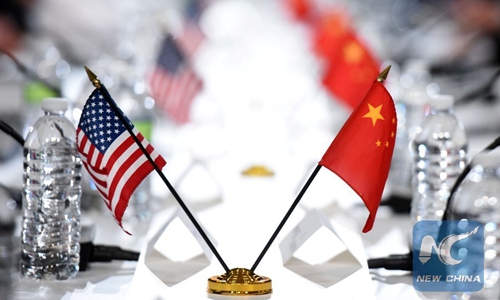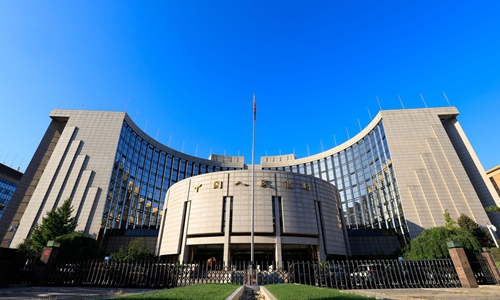(Global Times)09:01, June 15, 2020
Stark difference shows Beijing’s strategic focus on development path: analysts

File photo taken on November 23, 2016 shows the national flags of the United States and China during the 27th Session of the China-US Joint Commission on Commerce and Trade in Washington DC, US. Photo: Yin Bogu/Xinhua
China took a concrete step over the weekend to further open up its $45 trillion financial market to foreign investors, as the countrys central bank issued a license to US credit card company American Express to clear transactions in the Chinese mainland, the first of such licenses for any foreign institution in line with the countrys long-term opening-up policies.
The latest move from the Chinese side, which followed a series of recent opening-up measures, came at a time when the US is actively cracking down on Chinese companies and seeking to shut the door to the US financial market for Chinese investors in what Chinese officials and experts call a bid to contain Chinas rise, with the bilateral relationship being at its lowest ebb in decades.
The starkly different approaches taken by the worlds two largest economies also encapsulated the shifting trend of the global economic power structure propelled by rising tensions and a public health crisis. While the US is increasingly losing its grip in face of a flurry of domestic social, political and economic woes, China maintains remarkable strategic focus on its long-term development path, despite its own considerable challenges, Chinese analysts noted.

A view of the PBCs headquarters in Beijing Photo: cnsphoto
Door to $27trillion market
In a statement on Saturday, the Peoples Bank of China (PBC), Chinas central bank, gave the green light to Express (Hangzhou) Technology Services Co, a joint venture between American Express and Chinese fintech firm Lianlian DigiTech Co, to clear yuan transactions, effectively opening the door for the US company to a massive Chinese payment market, estimated to be worth $27 trillion. Operation should commence within six months from the issuance date of the license, the statement said.
This is another specific example of China expanding, opening and deepening supply-side reform in the financial sector, the PBC said in the statement, noting that the move is conducive to improving Chinas payment services and the yuans internationalization .
We are pleased to be the first foreign company to receive this license. This approval represents an important step forward in our long-term growth strategy and is a historic moment, Stephen J. Squeri, chairman of American Express, said in a statement the company sent to the Global Times on Saturday.
While being the first to receive a payment clearance license, American Express is hardly the first single US financial institution that has been allowed to enter Chinas $45 trillion financial market.
In February, China approved another US payment firm Mastercard Incs application to set up bank card clearing services in the Chinese mainland. In May, a wholly owned subsidiary of US-based global ratings firm Fitch Ratings in China had also received approval from the PBC to rate Chinas domestic bond market. Other US financial institutions that have also gained access in various sectors include investment firms Russell Investments, Goldman Sachs, Morgan Stanley and asset manager BlackRock, according to PBC Governor Yi Gang on May 26.
The [COVID-19] epidemic did not disrupt the pace of our countrys financial opening, Yi said during an interview with two domestic financial news outlets. Yi further pointed out that China has announced as many as 40 measures for financial opening-up in recent years, and opening-up measures for a wide range of sectors including banking, securities and asset management were being implemented
Stark difference
However, even as China is pushing forward sweeping opening-up measures, on the other side of the Pacific Ocean, the US government has taken what analysts call unprecedented efforts to crack down on Chinese companies.
Following its multi-year crackdown on Chinese high-tech giant Huawei, Washington has also expanded their target to include more Chinese tech companies in their crackdown campaign. In recent weeks, the US administration has been moving to delist Chinese companies listed in US stock exchanges.
An anti-China advocacy group which includes a former White House official is also reportedly urging the Trump administration to ban Chinese companies from entering US financial markets altogether.
The starkly different approaches from Beijing and Washington also presented a moment of truth amid rising tension between the two largest economic powers, when the world could see the US true colors of an inward mentality and protectionism and Chinas increasing openness, said Dong Dengxin, director of the Finance and Securities Institute at the Wuhan University of Science and Technology.
Chinas move to open up its financial sector to US companies shows its confidence in globalization and in its opening-up strategy which the country will stick to regardless of what the US believes in and chooses to do, Dong told the Global Times on Sunday.
Although financial opening was part of negotiations between Chinese and US officials in the phase one trade agreement, which was signed in January, Chinas latest measures are in line with its own long-term opening strategy, analysts noted.
In light of the COVID-19 pandemic, top Chinese officials, including Premier Li Keqiang, have also publicly welcomed more foreign companies of all types to invest in China.
In a high-profile letter to congratulate US firm Honeywells opening of a regional headquarters in Wuhan, Central Chinas Hubei Province, Li said that Chinas commitment to deepening reform, opening-up and welcoming overseas enterprises to expand investment and cooperation with China will remain unchanged.
Such remarks signal that more opening measures in financial sector and other sectors could follow, regardless of what the US says or does about China and Chinese companies, according to analysts.
It is important to stress that while opening up the financial sector fits into the phase one deal, it is more of a proactive move at our own pace, Gao Lingyun, an expert at the Chinese Academy of Social Sciences in Beijing who closely follows the China-US trade talks, told the Global Times on Sunday.
Gao also added that welcoming qualified US companies into the Chinese market does not mean that China will not respond to US actions that have damaged Chinas economic interests.
If the US follows through on all its threats to hurt Chinese companies, China will definitely take countermeasures as well as to help those affected companies, he said.
![]()


